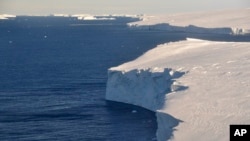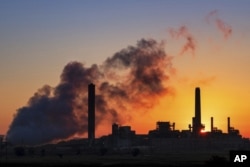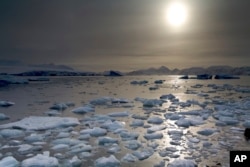Increasing amounts of ice have been melting on the continent of Antarctica over the past ten years. Now, scientists are wondering if the increase in melting is temporary or if it will continue—and perhaps melt even faster—for years into the future.
Nearly 1,500 experts who study Antarctica gathered in southern Chile last week to share results of their research. They discussed the extreme weather events that struck parts of the continent this year: heavy rainfall, unusually warm temperatures, and strong dry winds.
The researchers say these events added to recent increases in melting. However, detailed weather data for Antarctica dates back only about 40 years. That is one reason climate scientists are unsure if the current melting is temporary or the beginning of a longer trend.
NASA estimates show a possible 58-meter rise in the average worldwide sea level if all Antarctic ice melted. Studies have shown that about a third of the world's population lives below 100 vertical meters of sea level.
Liz Keller is a paleoclimate specialist from the Victoria University of Wellington in New Zealand. She says scientists have never before seen Antarctic ice melting so quickly. She also spoke about the increasing amounts of carbon dioxide gas, CO2, in the earth’s atmosphere.
“You might see the same rise in CO2 over thousands of years, and now it's happened in 100 years," Keller said. Carbon dioxide traps heat in the atmosphere.
Mike Weber is a paleooceanographer from the University of Bonn in Germany. He studies the movements of Antarctic ice over thousands of years. He said records dating back 21,000 years show at least eight times when the ice melted quickly. He added that the data show the periods of ice loss sometimes lasted for hundreds of years. This led to much higher sea levels around the world.
Weber said scientists want to know if the melting seen during the last ten years has started a melting trend that will last for centuries.
"Maybe we're entering such a phase right now," he said. "If we are, at least for now, there will be no stopping it."
Some of the scientists in Chile agreed that the most harmful rise in sea level can still be avoided if fossil fuel emissions decrease. Weber noted that when glaciers melt, the earth’s land can rise because there is less weight pushing it down. Recent research suggests that if the melting does not happen too quickly, the rising land could nearly equal the rise in sea level. But if the melting happens too quickly, the rise in land could not meet the increase in sea level.
"If we keep emissions low, we can stop this eventually," said Weber. "If we keep them high, we have a runaway situation and we cannot do anything."
Mathieu Casado is a paleoclimate and polar meteorologist at France's Climate and Environment Sciences Laboratory. He has examined ice from all over Antarctica to estimate temperatures dating back 800,000 years.
Casado said that the last time the Earth was this warm was 125,000 years ago and that sea levels then were 6 to 9 meters higher. He and other scientists said the speed and amount at which carbon is entering the atmosphere has never been so high.
Gino Casassa is a glaciologist and head of the Chilean Antarctic Institute. He said that current estimates show sea levels rising by 4 meters by 2100 and more if emissions continue to grow.
"What happens in Antarctica doesn't stay in Antarctica," said Casassa, adding that global atmospheric, ocean and weather systems are linked to the continent.
I’m Andrew Smith.
Alexander Villegas reported this story for Reuters news agency. Andrew Smith adapted it for VOA Learning English.
________________________________________________
Words in This Story
trend -n. a tendency or development continuing over a period of time
phase -n. a particular stage or period of time in a process
emissions -n. gases released into the atmosphere








Forum